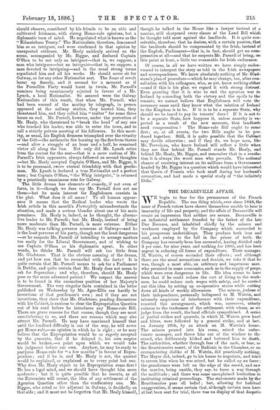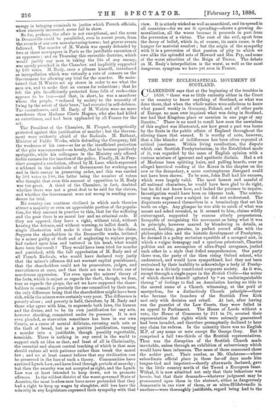THE DECAZEVILLE AFFAIR.
WE begin to fear for the permanence of the French Republic. The one thing which, ever since 1848, the mass of French voters have shown themselves unable to bear is
insecurity of life and property, and the affair of Decazeville will create an impression that neither are secure. Decazeville is an industrial settlement founded by the father of the late Due Decazes, and inhabited chiefly by the miners and workmen employed by the Company which succeeded to his prosperous undertakings. They produce both iron and coal, and owing to the fall in the prices of both, the Company has recently been less successful, having divided only 3 per cent. for nine years, and nothing for 1885, and has been urgent in reducing all forms of expenditure. Their manager, M. Watrin, of course seconded their efforts ; and although there are the usual accusations and denials, we take it that-he was, though a most able, an arbitrary and impetuous man, who persisted in some economies, such as in the supply of props, which were even dangerous to life. His idea seems to have been that if he could reduce the cost of living to the work- men, he could reduce cash wages with safety, and he carried out this idea by setting up co-operative stores while cutting down all kinds of weekly allowances. The miners, jealous of their independence, personally indisposed to M. Watrin, and intensely suspicious of interference with their expenditure, resented this arrangement, which was, moreover, utterly ruinous to the tradesmen of the settlement, with whom, as we judge from the result, the local officials sympathised. A series of partial strikes and quarrels, in which M. Watrin grew hard and bitter, were followed by a general strike, and at last, on January 26th, by an attack on M. Watrin's house. The miners poured into his room, seized the unfor- tunate manager, and threw him out of the window to the crowd, who deliberately kicked and battered him to death. The authorities, whether through fear of the mob, or fear, as the Reactionaries assert, of the Radicals in the Chamber, or an overmastering dislike of M. Watrin, did practically nothing. The Mayor did, indeed, go to his house to negotiate, and tried to screen him when he was seized, but he called up no force ; the gendarmes were left on the edge of the crowd, and saw the murder, being unable, they say, to force a way through the multitude ; and there was some unexplained hesitation-in instituting criminal proceedings. The statements made by the Reactionaries pass all belief ; but, allowing for habitual exaggeration, it seems certain that, although certain men have at last been sent for trial, there was no display of that despotic energy in bringing criminals to justice which French officials, when sincerely interested, never fail to show. So far, perhaps, the affair is not exceptional, and the scene in Decazeville could be parallelled, even in recent years, from the records of our own manufacturing towns ; but graver events followed. The murder of M. Watrin was openly defended by two or three newspapers in Paris as the justifiable execution of an oppressor ; and on Thursday this execrable doctrine, which would justify any man in taking the life of any enemy, was openly preached in the Chamber, and implicitly supported by 188 votes. M. Basly, once a pitman himself, introduced an interpellation which was virtually a vote of censure on the Government for allowing any trial for the murder. He main- tained that M. Watrin set up stores in order to see what the men ate, and to make that an excuse for reductions ; that he left the pits insufficiently protected from falls of rock—this appears to be true—and that, in short, he was a murderer whom the people, " reduced by society to the necessity of living by the sweat of their brow," had executed in self-defence. The executioners, said M. Basly, of M. Watrin were no more murderers than Madame Clovis Hugues, who also had killed an extortioner, and had been applauded by all France for the act.
The President of the Chamber, M. Floquet, energetically protested against this justification of murder ; but the Govern- ment were evidently afraid of the Radicals. M. Bathaut, Minister of Public Works, while defending the Company, felt the weakness of his case—so far as the insufficient protection of the pits was concerned—so keenly, that he became positively apologetic, while his colleagues in the Ministry only offered feeble excuses for the inaction of the police. Finally, M. de Frey- cinet accepted a resolution, offered by M. Laur, which expressed c.nfidence in the solicitude of Government for working-men and in their energy in preserving order, and this was carried by 301 votes to 188, the latter being ;he number of voters who thought that even this amount of opposition to M. Basly was too great. A third of the Chamber, in fact, doubted whether there was not a great deal to be said for the rioters, and whether the Government were not wrong in sending mur- derers for trial.
No country can continue civilised in which such theories attract a majority or even an appreciable portion of the popula- tion, for they amount in practice to this, that for the suffering -and the poor there is no moral law and no criminal code. If -they are opposed, they have a right, without trial, without hearing the defence, and without warning, to inflict death. A .single illustration will make it clear that this is the claim. .Suppose the shareholders in the Decazeville works, irritated • loy a miner guilty of theft and of neglecting to replace props, had rushed upon him and battered in his head, what would have been the result ? They would have been tried for murder and punished, with the full approbation of M. Basly and of all French Radicals, who would have declared very justly that the miner's offences did not warrant capital punishment, that the shareholders could not be prosecutors, judges, and executioners at once, and that their act was in truth one of murderous oppression. Yet even upon the miners' theory of the facts, which is unjust as regards the theft, though, we fear, true as regards the props, the act we have supposed the share- holders to commit is precisely the one committed by their men, the only difference being that the shareholders might have been rich, while the miners were certainly very poor. The difference is poverty alone ; and poverty is held, therefore, by M. Basly and those who agree with him, to supersede both laws, the human and the divine, and to be its own justification for any acts, however shocking, committed under its pressure. It is not even pleaded, as starvation sometimes has been in our own Courts, as a cause of mental delirium, excusing such acts as the theft of bread, but as a positive justification, turning a murder into a justifiable, though possibly regrettable, homicide. There is nothing in any creed in the world to support such an idea as that, and least of all in Christianity, the essential and almost central teaching of which is that man should endure all with patience rather than break the moral law ; and we at least cannot believe that any civilisation can be preserved in the face of such a theory. Communities have survived Lynch Law, and have lived through periods of anarchy ; but then the anarchy was not accepted as right, and the Lynch Law was at least intended to keep down, not to promote offences. In the wildest district of the worst-governed State of America, the most lawless men have never pretended that they had a right to keep up wages by slaughter, still less have the minority in any Legislature expressed their sympathy with that view. It is utterly wicked as well as anarchical, and its spread in all countries—for we see it spreading—shows a growing de- moralisation, all the worse because it proceeds in part from the perversion of a virtue. The root of the evil, apart from the decay of belief, which is, of course, its main cause, is the hunger for material comfort ; but the origin of the sympathy with it is a perversion of that passion of pity to which we owe alike the splendid acts of Howard and Mrs. Fry, and some of the worst atrocities of the Reign of Terror. The debate on M. Basly's interpellation is the worst, as well as the most dangerous, symptom we have yet seen in France.



































 Previous page
Previous page